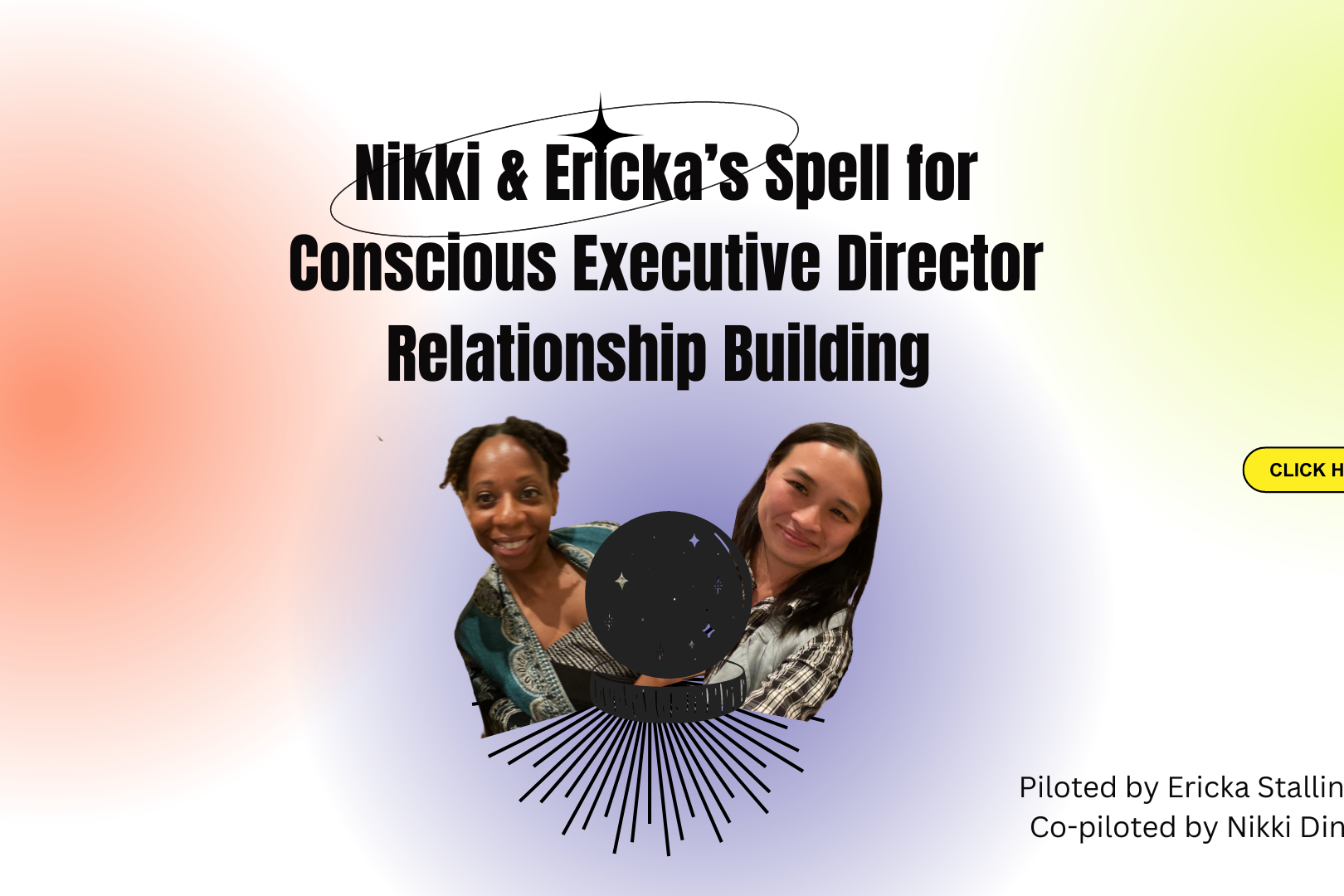
Thanks to those of you who joined our happy hour in Oakland to meet our new Co-Director, Ericka Stallings. I have to say onboarding Ericka made it a ‘happy week, and our process was well worth the time we took. Along the way, there have been many lessons for the LLC board and staff, and of course, me. We wanted to pause and share some of our reflections and maybe encourage you to consider this model.
Co-Directorship: Three Lessons Learned…so far
By Deborah Meehan, Co-Executive Director
Grounding in equity: We did not get any candidates with three years of experience as an Executive Director, accompanied by a depth of experience working at the intersection of equity and leadership within the leadership development field. This is not at all surprising given the well-documented underrepresentation of people of color in leadership positions in the sector. Institutional racism has kept people of color from the opportunity to acquire these skills. Allocating resources for equity funds to provide this management training is one of the things we can do to address this legacy in the sector and provide opportunities for people of color to lead and center equity in the work of non-profit organizations. As leadership transitions are occurring with the retirement of baby boomers from the sector, we have an opportunity to have explicit conversations about how to disrupt the exclusion of people of color and address the professionalization of the sector, and that gets to the second lesson. LLC is lucky to have had a selection team and board eager for this conversation.
Valuing what is most important: Many years ago, LLC conducted several listening groups as part of a project funded by the Annie E. Casey Foundation to explore why there were not more people of color in leadership positions in the non-profit sector. One comment that really struck me and stayed with me was from a woman who said, “If you asked the community being served by an organization to create a job description for its leadership, it would look nothing like your typical ED job description.” She was referring to the professionalization of the non-profit sector, where the primary emphasis is on management skills and not the passion and lived experience with the issues the organization addresses. This is not to say that those management skills (financial management, supervision, fund development, etc.) are unimportant. They are, and they can be acquired more easily, or even outsourced, than what is often at the heart of the work, which for us is leadership and equity. Our job description was overly focused on management tasks, and we would probably not have gotten the good candidates we did without actively recruiting people with the experiences we value most. Even without being an executive director, Ericka had more management experience than I had when starting an organization. It will be hard to change the patterns of underrepresentation without rethinking job descriptions, which replicate these patterns by paying more attention to what we have had than what we need.
Making time for learning and tapping the group’s wisdom: I was in a hurry to bring on a Co-ED. It was an idea I had been enthusiastic about for a long time. Even though I was in a rush, we were slowed down by a thoughtful board that took time to explore the Co-Director model to ensure we were not hiring a ‘deputy director’ in disguise. We spent time on a RACI chart looking at how work would be distributed and shared, including the levels of shared authority and power. Without taking time, it’s easy to default to normative approaches, e.g., a traditional job description, just looking at immediate circles, etc. Our selection committee paused the process to talk about equity and invested time in multiple interviews. Our job was tough in a good way, and we had lots of great candidates. I came to respect the importance of having so many people involved who brought different perspectives that could not be held by one person, e.g., what kind of relationships and networks could the candidates leverage to advance our work; what would be the different skills you would want in two Co-EDs to compliment each other; and of course, opportunities to check or explore unexamined bias. I am grateful to the folks in the process who had the wisdom to slow it down and make time for learning and collective wisdom. As you meet Ericka, you will agree that it was time well spent.
Reflections on the Hiring Process
By Ericka Stallings, Co-Executive Director
Thanks to everyone who has welcomed me to the LLC community. I am so excited about what we will be able to do together. The onboarding experience has been so positive that I keep waiting for the other shoe to drop. I told one board member I was wondering who in the LLC community would be less than welcoming because I haven’t found one yet; literally, every single person I have encountered so far has been warm, kind, and thoughtful. Board member Lisa Leverette assured me that my experience was not unique and that the LLC network was simply that giving. At this point, I’m definitely in danger of losing what little bit of New York toughness I ever had. Maybe I won’t miss it!
My joy-filled onboarding process has been consistent with my entire selection experience. When I think about why the experience has been so great, I identified five key components from a candidate’s perspective.
- Trust: The LLC selection process was very public, but because I had trust, initially in Deborah and later in the remainder of the selection team, I was willing to engage in that public process. In fact, I wasn’t truly aware of trust as a factor until someone asked me, after-the-fact, if the public process had been at all concerning to me, it was then I realized that it never occurred to me that my trust would have been misplaced.
- Relationships: This ability to trust would not have been possible had I not felt an authentic relationship developing with Deborah. Now, to be fair, it’s pretty easy to form a relationship with Deborah; she’s just lovely and achingly real. We met at a three-day Robert Sterling Clark retreat; after talking in small groups, sharing meals, playing board games, and talking deeply about ourselves and the work, Deborah showed me what an open and intentional person she is. The relationship grew when we did a webinar together. Later, the others on the selection team made up of the LLC board and staff, were also friendly and open, allowing their humanity and personalities to come forward. Throughout the process, I felt like I was getting to know them as people and that our relationship was real and authentic.
- Transparency: The transparency of the process, not only with the network and general public but also with the candidates, also helped to build trust. In addition to the process being very transparent, LLC’s vision, mission, and values were also very clear and present, such that I never felt the information was being held back to put me at a disadvantage, which has happened in other selection processes.
- Mission and values alignment: When I reviewed LLC’s materials, observed the selection process, read Deborah’s reflective blog entries about the selection process, and got to know the selection team, I could see alignment in two ways. The first was I clearly saw alignment with my own values: the work LLC is pursuing was work I wanted to pursue; the values LLC articulated were values that were critically important to me; the commitments LLC made were commitments I was attempting to apply to my own life. Second, the trust-based, transparent, and relational selection process felt aligned with the articulated values and mission.
- Compassion: One of the core values demonstrated during the selection process was compassion for the candidate. In contrast to a standard interview process, I never felt like I was on the market trying to sell myself or prove my value. Instead, I felt like the selection team and I were a group of people simply trying to determine if and how we wanted to be in a relationship with one another. I never felt taken advantage of or worried about playing a game.
Without these practices, I might not have applied. Looking at the job description prior to applying, I knew objectively that I had the majority of the desired skills and capacities already under my belt. I was also fairly confident in my ability to develop the skills and capacities that I lacked. I previously oversaw a program with a budget and work portfolio comparable to that of LLCs. However, I’d never been an executive director before, where the buck stops with you. Other executive directors told me that you have to learn some components of the job by doing.
Still, knowing all of this, I would not have applied were it not for the intentional and compassionate process. My first reaction to viewing the posting, was very much “What, who me? Nope!” The intimacy of the process and Deborah’s personal outreach helped me get over my trepidation. This sense of hesitation is something women and people of color experience frequently, given all the undermining, oppressive experiences we are likely to have dealt with over the years. Any process attempting to apply an equity lens must address this head-on. LLC did this; they clearly communicated a willingness to give a new Co-ED both the time and the resources to grow into the position. LLC was and is willing to practice what they preach by actively investing in the growth and development of new LLC leadership.
These conditions mitigated my fears and created space for me to envision how I could apply my perspectives and experiences to advance the mission of LLC.
We are still in the very early stages of my time at LLC. While I’m sure there will be challenges to navigate, I already know this is a place where I want to be, and the LLC staff, board, and network are people I want to be with, working collectively to support leadership efforts that promote justice and equity.
Related Posts
October 24, 2023
Boo! What’s scary about shared and distributed leadership?
August 22, 2023




